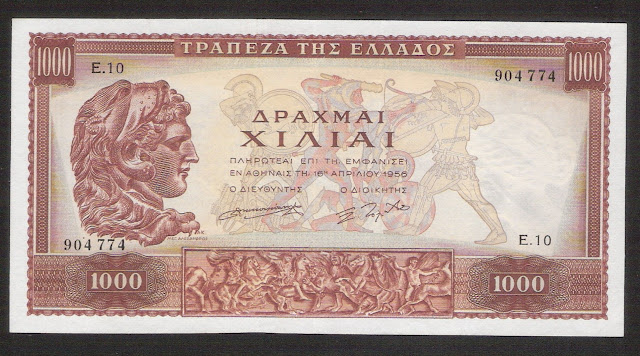 |
| 1000 Greek drachmas, Alexander the Great |
 |
| 1000-drachma note, Alexander on his horse Bukephalos attacking Darios |
Bank of Greece - 1000 Greek drachma banknote 1956 Alexander the Great
Obverse: Alexander image from Tarsos medallion - Alexander the Great wearing an elaborate helmet in the form of the lion scalp of Herakles.
At the bottom of the banknote depicted one of the four panels of the Alexander the Great Sarcophagus, the hunting scene showing Alexander and the Macedonians hunting lions and wild animals together with Abdalonymus and the Persians, with the help of dogs. Some Macedonians are depicted in heroic nudity.
Reverse: Alexander on his horse Bukephalos attacking Darios, the Persian Great King, at the Battle of Issos. This scene is part of the "Alexander Mosaic" that was uncovered in Pompeii, Italy, and resides in the National Archeological Museum in Naples, Italy. It's thought to be a Roman copy of a late 4th century BC Macedonian fresco.
TPAΠEZA THΣ EΛΛAΔOΣ - BANK OF GREECE
1954-1956 Issue
10 Drachma 20 Drachma 50 Drachma
100 Drachma 500 Drachma 1000 Drachma
Alexander the Great
Alexander III of Macedon (20/21 July 356 BC – 10/11 June 323 BC), commonly known as Alexander the Great, was a King (Basileus) of the Ancient Greek kingdom of Macedon and a member of the Argead dynasty, a famous ancient Greek royal house. Born in Pella in 356 BC, Alexander succeeded his father, Philip II, to the throne at the age of twenty. He spent most of his ruling years on an unprecedented military campaign through Asia and northeast Africa, and by the age of thirty he had created one of the largest empires of the ancient world, stretching from Greece to Egypt and into northwest India. He was undefeated in battle and is considered one of history's most successful military commanders.
During his youth, Alexander was tutored by the philosopher Aristotle until the age of 16. After Philip was assassinated in 336 BC, Alexander succeeded his father to the throne and inherited a strong kingdom and an experienced army. He had been awarded the generalship of Greece and used this authority to launch his father's Panhellenic project to lead the Greeks in the conquest of Persia. In 334 BC, he invaded the Achaemenid Empire, ruled Asia Minor, and began a series of campaigns that lasted ten years. Alexander broke the power of Persia in a series of decisive battles, most notably the battles of Issus and Gaugamela. He subsequently overthrew the Persian King Darius III and conquered the Achaemenid Empire in its entirety. At that point, his empire stretched from the Adriatic Sea to the Indus River.
Seeking to reach the "ends of the world and the Great Outer Sea", he invaded India in 326 BC, but was eventually forced to turn back at the demand of his troops. Alexander died in Babylon in 323 BC, the city he planned to establish as his capital, without executing a series of planned campaigns that would have begun with an invasion of Arabia. In the years following his death, a series of civil wars tore his empire apart, resulting in several states ruled by the Diadochi, Alexander's surviving generals and heirs.
Alexander's legacy includes the cultural diffusion his conquests engendered, such as Greco-Buddhism. He founded some twenty cities that bore his name, most notably Alexandria in Egypt. Alexander's settlement of Greek colonists and the resulting spread of Greek culture in the east resulted in a new Hellenistic civilization, aspects of which were still evident in the traditions of the Byzantine Empire in the mid-15th century and the presence of Greek speakers in central and far eastern Anatolia until the 1920s. Alexander became legendary as a classical hero in the mold of Achilles, and he features prominently in the history and mythic traditions of both Greek and non-Greek cultures. He became the measure against which military leaders compared themselves, and military academies throughout the world still teach his tactics. He is often ranked among the most influential people in human history, along with his teacher Aristotle.